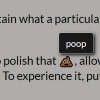
Maybe.

Maybe.

This is an excellent recap of my recent Maker Series workshop. Thanks for participating Philip!

Tooltips for emoji… I love this!
A little experiment:
The purpose of this page is to demonstrate that duplicate IDs can have real consequences even when only one view can ever be visible at any given time.

Supermarket chain Winn Dixie claims that Title III of the Americans with Disabilities Act doesn’t apply online in Gil v. Winn Dixie and the U.S. Department of Justice steps in to set them straight:
In response to Winn-Dixie’s position that Title III applies only to its physical location. DOJ cited the language of the ADA which says that “Title III applies to discrimination in the goods and services ‘of’ a place of public accommodation, rather than being limited to those goods and services provided ‘at’ or ‘in’ a place of public accommodation.” DOJ also argued Title III’s application to the website at issue is consistent with every other court decision to have addressed the coverage of websites with a nexus to brick and mortar locations.

This brief post includes some great tips on writing for readers, regardless of their actual age or reading level.

A new version of the NVDA screen reader came out just before the holidays and features better Windows 10 integration (including better Edge support).

A great set of tutorials from the Web Accessibility Initiative. I can’t wait to see this grow!

Why should you care?
Inclusive language acknowledges diversity, conveys respect to all people, is sensitive to differences, and promotes equal opportunities.
Good stuff!

This will be based on the Mozilla feature.